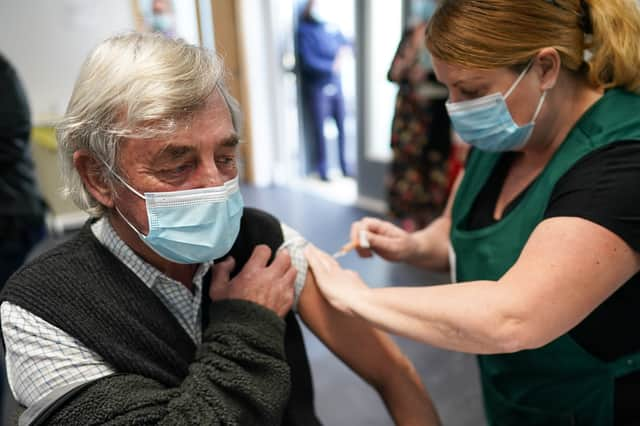Covid vaccines lower the risk of over-80s getting seriously ill by 80% - the latest data explained


Analysis from Public Health England (PHE) has revealed that both the Pfizer BioNTech and the Oxford/AstraZeneca vaccines are highly effective in reducing Covid-19 infections amongst older patients aged 70 and up.
For the over 80s, the data suggest that a single dose of either vaccine is more than 80 per cent effective at preventing hospitalisation, around three to four weeks after the jab. In terms of the Pfizer/BioNTech vaccine, there is also evidence that suggests that it leads to an 83 per cent reduction in deaths from the virus.
Advertisement
Hide AdAdvertisement
Hide Ad‘Significant reduction in symptomatic cases’
The study aimed to estimate the “real world effectiveness of the Pfizer/BioNTech vaccine and Oxford/AstraZeneca vaccine against confirmed Covid-19, hospitalisations and deaths” and to “estimate the effectiveness on the UK variant of concern”.
The conclusion of the pre-print of the real world study says: “Vaccination with either a single dose of [Pfizer/BioNTech or Oxford/AstraZeneca] Covid-19 vaccination was associated with a significant reduction in symptomatic SARS-CoV2 positive cases in older adults with even greater protection against severe disease.
“Both vaccines show similar effects. Protection was maintained for the duration of follow-up (>6 weeks).”
‘Evidence that vaccines are saving lives’
Dr Mary Ramsay, PHE Head of Immunisation, said: “This adds to growing evidence showing that the vaccines are working to reduce infection and save lives.
Advertisement
Hide AdAdvertisement
Hide Ad“While there remains much more data to follow, this is encouraging and we are increasingly confident that vaccines are making a real difference.
“It is important to remember that protection is not complete and we don’t yet know how much these vaccines will reduce the risk of you passing Covid-19 ont others.
“Even if you have been vaccinated, it is really important that you continue to act like you have the virus, practise good hand hygiene and stay at home.”
When asked if these effects are likely to be seen in other age groups as the vaccine rollout reaches young people on BBC Radio 4’s Today programme, Dr Ramsay said: “Yes, if anything we would expect it to be a stronger protection from the vaccine.
Advertisement
Hide AdAdvertisement
Hide Ad“The only difference obviously is that lower down in the age range if that people’s chances of being hospitalised and dying are much lower because this is a disease that has caused most of its morbidity in older people.
“So we would not be able to maybe see the effect as markedly as we have been able to in this [older] group that was vaccinated first.”
Ramsay added that “it really shows that the group we targeted was the right group for vaccination because this is the group where the deaths and hospitalisations were occurring”.
‘A sign of the vaccine working’
At the Downing Street press conference on Monday (1 March), Health Secretary Matt Hancock said that the latest vaccine results were “very strong”.
Advertisement
Hide AdAdvertisement
Hide AdHe said: “The number of hospitalisations is falling faster. Even better: among the age groups vaccinated first, the fall in hospitalisations is father than in younger age groups who are still yet to get a jab.
“This is a sign of the vaccine working. But where you can really see it is in the data on deaths - we can see that the number of deaths each day is thankfully falling much faster than after the first peak, and again, as you can see from this slide, is falling faster in the over-80s - who got their jab first - than in under 80s.”
Hancock described the data, which shows that a shot of either available vaccine works against severe infection amongst over-70s, as “extremely good news”.